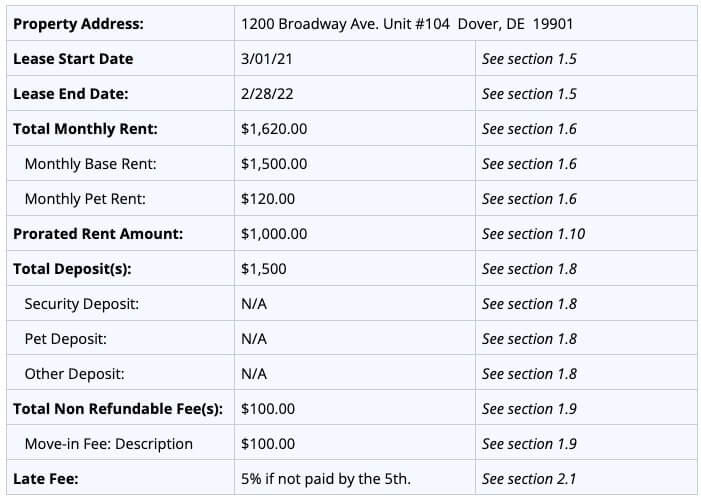Table of Contents
- Delaware Renters’ Rights and Landlord Responsibilities
- Delaware Landlords’ Rights and Tenant Responsibilities
- Rental Application Fee
- Criminal Background Check
- Repairs
- Security Deposit
- Lease Agreement Disclosures
- Delaware Lease Agreement Example
- Delaware Landlord-Tenant Law FAQ
- Due Diligence and Delaware Rental Laws
- Delaware Landlord-Tenant Law Resources
Related Laws
Delaware is one of the top states for property investors to purchase rental units because there is no property tax. The fair cost of living and location is a big draw for those looking to relocate, which means finding a tenant is easier than in other states.
Laws that impact the rental market, landlords, and tenants are constantly being decided in states. Make sure you know what’s on your ballot – find Delaware voting information.

Delaware Renters’ Rights and Landlord Responsibilities
- Have 20 days to return security deposit
- No notice required before raising rent
- A 60-day notice required before entering the property
- Required to make repairs within 12 days
When it comes to Delaware rental laws, there are a few specifics landlords need to know:
- Security Deposit – Delaware limits the amount a landlord may charge for the security deposit to the equivalent of one month’s rent. Landlords must return the deposit within 20 days of the tenant moving out.
- Raising Rent – Landlords in Delaware may increase the rent to any amount for any reason with a 60-day notice.
- Notice of Entry – Delaware requires a 48-hour notice from the landlord before entering the unit or property.
- Repairs – It is the landlord’s responsibility to keep the rental in safe and healthy living conditions. Landlords must make repairs within 12 days after being notified by the tenant. If the landlord fails to make these repairs, the tenant may withhold up to two-thirds rent, or pay for the repairs and deduct the cost from their next rent payment.
Delaware Landlords’ Rights and Tenant Responsibilities
- Required to issue a five-day notice before filing for eviction
- Must give a 60-day notice before terminating a lease
- Tenants must keep the unit in safe and habitable condition
- Overdue Rent – If a tenant fails to pay rent on time, the landlord must issue a notice that gives the tenant five days to pay. If the tenant still doesn’t pay, the landlord may file for eviction.
- Terminating a Lease – If a tenant needs to terminate a month-to-month lease, they must give the landlord a 60-day notice.
- Tenant Responsibilities – Tenants are required to keep the property clean and not disturb neighbors.
Rental Application Fee
Delaware landlords can charge an application fee not to exceed the greater of 10% of monthly rent for the unit or $50.00.
Criminal Background Check
- HUD (Federal) laws do not classify criminal backgrounds as a protected class, but making a decision to rent based off a criminal background alone could lead to a discrimination charge as it impacts certain protected groups of people disproportionately.
- However, if the criminal background check revealed a crime for the manufacture and distribution of drugs, homicide and/or stalking, denying the application is allowed.
- Landlords should have a consistent and equal policy or procedure in place to follow regarding criminal background checks so as not to discriminate against one class of people over another.
- HUD states that a landlord cannot ask about arrest records, only convictions, as innocent people are commonly arrested though the situation may not have resulted in a conviction.
- Some municipalities may have written their own laws expanding onto what you can and cannot ask regarding criminal backgrounds during the tenant screening process.
Repairs
Delaware landlords have 15 days to make repairs after being notified by their tenant.
Security Deposit
- Delaware limits the amount a landlord may charge for the security deposit to the equivalent of one month’s rent for unfurnished units. There is no limit to the security deposit if the rental unit is furnished.
- Landlords must hold security deposits in a FDIC bank with an office in the state.
Lease Agreement Disclosures
- Delaware landlords must disclose the name and location of the bank where the tenant’s security deposit is held.
- Landlords must provide this summary of the Landlord-Tenant Code to tenants at the start of the lease.
Build a Delaware lease agreement in less than 15 minutes.
Delaware Lease Agreement Example
There are three sections to a residential lease agreement. The first section outlines the custom details of the contract, such as who’s involved and for what address. Here’s an example Delaware lease agreement listing details found in Section 1:
Delaware Landlord-Tenant Law FAQ
Below are answers to some of the most commonly-asked questions when it comes to landlord-tenant laws in Delaware:
Can You Withhold Rent in Delaware?
If a landlord fails to make necessary repairs, the tenant may pay for those repairs and deduct the price from their next rent payment or withhold two-thirds of their rent.
How Long Does it Take to Evict a Tenant in Delaware?
Evicting a tenant in Delaware can take anywhere from 1 to 3 months, depending on the reason for eviction.
Is Delaware a Landlord-Friendly State?
Delaware is not a landlord-friendly state because of the restrictions and responsibilities of landlords.
What is the Eviction Process in Delaware?
There are four reasons a landlord may file for eviction in Delaware. The four reasons include failing to pay rent, violation of the lease agreement, illegal activity, and the end of the lease term. Depending on the violation, the landlord must give the tenant anywhere from 5 to 60 days to cure their violation.
If the tenant fails to cure or quit, then the landlord may file a complaint with the court, which costs $45. After the complaint is filed, it will be served to the tenant within 5 to 30 days.
The hearing will then be scheduled within a few days to a few weeks.
If the court rules in favor of the landlord, then a writ of possession will be issued within 10 days. Once received, the tenant will need to move out within 24 hours.
How Much Notice Does a Landlord Have to Give a Tenant to Move Out in Delaware?
Landlords are required to give a 60-day notice before asking a tenant to vacate the property.
Due Diligence and Delaware Rental Laws
TurboTenant has utilized many municipal sources and official state statutes to compile this information to the best of our ability. However, local laws are constantly in flux, and landlords and tenants alike should do their due diligence and consult legal help when it’s needed. We hope the following list can serve as a valuable resource and allow you to succeed as a landlord or tenant in Delaware. Be sure to take proper precautions when it comes to finding the top candidates for your unit by utilizing our online rental application and tenant screening services.
Disclaimer: TurboTenant, Inc does not provide legal advice. This material has been prepared for informational purposes only. All users are advised to check all applicable local, state, and federal laws, and consult legal counsel should questions arise.

Unlimited Everything.
Create a single Delaware lease agreement, or subscribe and receive unlimited lease agreements, landlord forms pack, and e-signs for a simple annual fee. Be confident with all the legal forms and tools you need as a professional landlord.
Discover Our Unlimited PlanDelaware Landlord-Tenant Law Resources
Delaware Fair Housing Resources
Delaware Associations
Delaware City-Specific Housing Resources
Wilmington
Dover
- Responsibilities of owners and occupants – Kent County Codes
- Fair Housing Policy – Kent County
- Kent County Association of REALTORS®
Newark
- Landlord / Tenant Resources – City of Newark
- Tenant Information – New Castle County
- Landlord/Tenant Q and A’s – City of Newark
- New Castle County Board of REALTORS®
Middletown
- Rental Property Ordinance – City of Middletown
- Licensing and Inspections Department Rental Inspections Procedure – City of Middletown
- Tenant Information – New Castle County
- New Castle County Board of REALTORS®
Federal Fair Housing Resources







